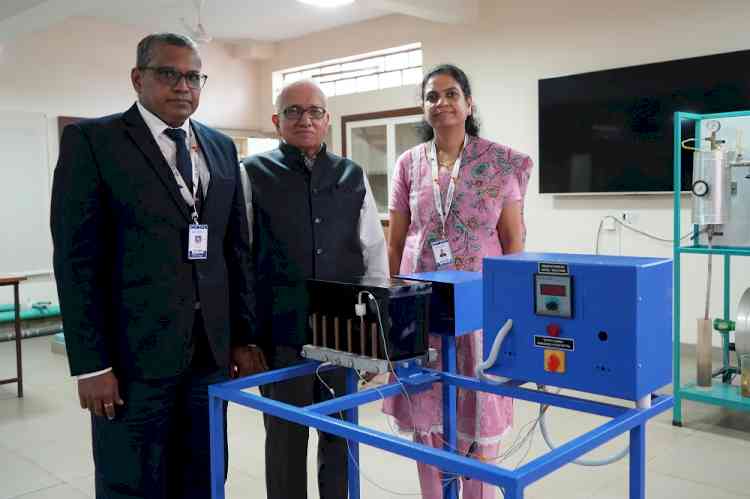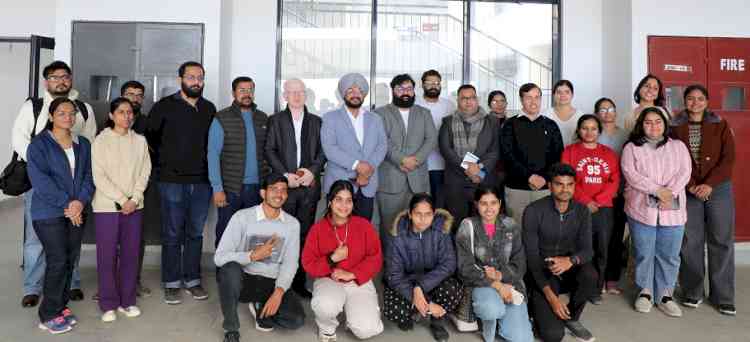Researchers at MIT-WPU Develop Hybrid Nanofluid Cooling System to Prevent EV Battery Overheating and Fires
Researchers at MIT World Peace University (MIT-WPU), Pune have developed a patented passive hybrid cooling system—granted under the Indian patent “System for Thermal Management of Battery of Vehicle” (Patent No. 202121029238)—that significantly enhances thermal management in electric vehicle (EV) batteries. Designed to improve both performance and safety, the system addresses the challenges posed by India’s high-temperature conditions and rising EV fire incidents.

Pune, November 26, 2025: Researchers at MIT World Peace University (MIT-WPU), Pune have developed a patented passive hybrid cooling system—granted under the Indian patent “System for Thermal Management of Battery of Vehicle” (Patent No. 202121029238)—that significantly enhances thermal management in electric vehicle (EV) batteries. Designed to improve both performance and safety, the system addresses the challenges posed by India’s high-temperature conditions and rising EV fire incidents.
The research team includes Dr. Vaibhav Deshmukh, Associate Professor, Department of Mechanical Engineering; Dr. S. Radhakrishnan, Professor Emeritus & Director Research, Department of Materials Science and Engineering; and Dr. Vaidehi Deshmukh, Assistant Professor, Department of Electrical and Electronics Engineering. They designed a hybrid passive cooling architecture that combines high-efficiency heat pipes with a specially engineered nanofluid, offering a pump-free, energy-efficient alternative to conventional EV battery cooling systems.
What makes this patented innovation particularly unique is its fully passive hybrid cooling mechanism that operates entirely through natural convection and phase-change processes—without the use of pumps, fans or any additional electrical power. The integration of a custom-engineered nanofluid, enhanced with thermally conductive nanoparticles and low-boiling-point liquids, enables rapid heat extraction from battery hotspots. When paired with high-efficiency heat pipes, the system maintains stable thermal conditions even in extreme environmental temperatures, providing a high-reliability, energy-independent and inherently safer alternative to current air- or liquid-based EV cooling technologies, making it especially suited to India’s climatic conditions.
Unlike traditional cooling systems, this patented technology removes heat rapidly using natural convection and phase-change processes rather than forced circulation. By maintaining stable battery temperature, the system significantly improves battery lifespan, charging efficiency and user safety.
Highlighting the significance of the breakthrough, Dr. Vaibhav Deshmukh said, “In an environment such as India’s—with high ambient temperatures and rapidly growing EV usage, the challenge isn’t just about performance, it is about safety first. Our passive hybrid cooling system ensures that the battery pack remains within safe thermal limits without drawing power from the vehicle’s system, thereby enhancing both reliability and operational efficiency.”
Dr. S. Radhakrishnan noted that the aim was to leapfrog existing technologies: “Our goal was to enhance safety and reliability by eliminating active mechanical components that may fail or draw additional energy, and deliver a robust solution tailored for high-temperature markets and rising fire-risk concerns.”
Dr. Vaidehi Deshmukh added: “By integrating a thermally enhanced nanofluid with a heat-pipe architecture—and removing pumps or fans—we’ve addressed two of the biggest challenges faced by OEMs: energy overhead and thermal hotspots. This significantly strengthens the safety profile of EVs in markets like India.”
The relevance of the innovation is underscored by rapidly accelerating EV adoption and rising expectations around reliability. Industry forecasts indicate that the global electric vehicle battery thermal management systems (BTMS) market, estimated at approximately USD 5.41 billion in 2024, is projected to reach around USD 29.09 billion by 2030, reflecting a strong growth trajectory driven by demand for longer range, faster charging and improved safety standards. In India, the EV-battery cooling systems market is projected to grow from about USD 138 million in 2025 to nearly USD 470 million by 2034, while the broader Battery Management System (BMS) market is expected to rise from approximately USD 199 million in 2024 to USD 8.39 billion by 2035.
At the same time, increasing concerns around EV safety have brought thermal incidents to the forefront. India’s EV penetration has reached around 7.8% in FY 2024-25, and media as well as industry assessments frequently cite battery thermal runaway and insufficient cooling as major pain-points contributing to fire-related risks—particularly in two-wheelers and three-wheelers, which dominate the adoption curve. Although consolidated national statistics on EV fire counts remain limited, expert analyses emphasize the urgent need for more reliable thermal management systems to avoid overheating and enhance consumer confidence.



 City Air News
City Air News 










